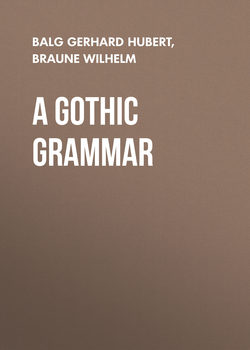Читать книгу A Gothic Grammar - Braune Wilhelm - Страница 8
FONOLOGY
CHAP. II. THE VOWELS
ei
Оглавление§ 16. Like Greek ει at the time of Wulfila, and in imitation of it, Gothic ei denotes long î.
Note 1. In Greek words ei uzually stands for ι, but also for ei, and sumtimes for η.
Note 2. Concerning ei for Goth. ê, s. § 7, n. 2.
Note 3. The difthongal pronunciation of ei suggested by J. Grimm is refuted also for linguistic reasons. Cp. J. Schmidt, 'Idg. Vocalismus', I, 485; Litbl. 1886, 485; Brgm., I, 57.
§ 17. ei in stem syllabls of Gothic words occurs especially in the prs. tense of the I. series (§ 30): beitan, to bite; steigan, to mount; þeihan, to thrive; in the inflection of these verbs it interchanges with ai and i.
Other exampls: ƕeila, time; eisarn, iron; leiþu, cider; þreis, 3; leihts, light; weihs, holy; skeirs, clear; pronouns: weis, we; meins, þeins, seins; – very often in formativ and inflectional syllabls; as, adjs. in -eigs (mahteigs, mighty); in -eins (aiweins, eternal); nomina actionis in -eins (laiseins, doctrin); nom. and gen. sg. of the m. ja-stems: haírdeis, herd; laisareis, teacher; nom. pl. of the i-decl.: gasteis; opt. prt.: nêmeis; final, in feminins in -ei: managei (§ 113); imperativs: sôkei, etc. (§ 186); the rel. particl ei (§ 157), alone and in composition.
Note 1. ei is quite often represented by ê; as akêtis; Mt. XXVII, 48; wêhsa; Mk. VIII, 26. 27; akê; Gal. II, 14; izê; Mk. IX, 1. Lu. VIII, 13. 15, etc. – Here perhaps belongs also awêþi (§ 7, e), which, however, occurs three times with ê: Jo. XVI, 16. I. Cor. IX, 7; cp. Beitr., 11, 32; 18, 286.
Note 2. Onse (in seiteina; II. Cor. XI, 28) occurs ei beside in (in sinteins, daily; sinteinô, always).
Note 3. Beside gabeigs, rich (gabei, riches), which occurs 5 times in Luke, also II. Cor. VIII, 9. Eph. II, 4 (in B), we find more frequently (11 times) gabigs (> gabigjan, to enrich; gabignan, to grow rich); cp. Brgm., II, 261. 271.
